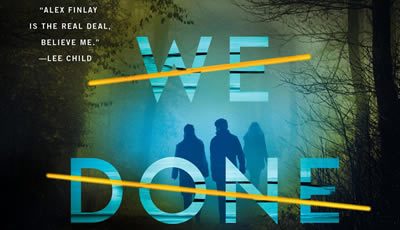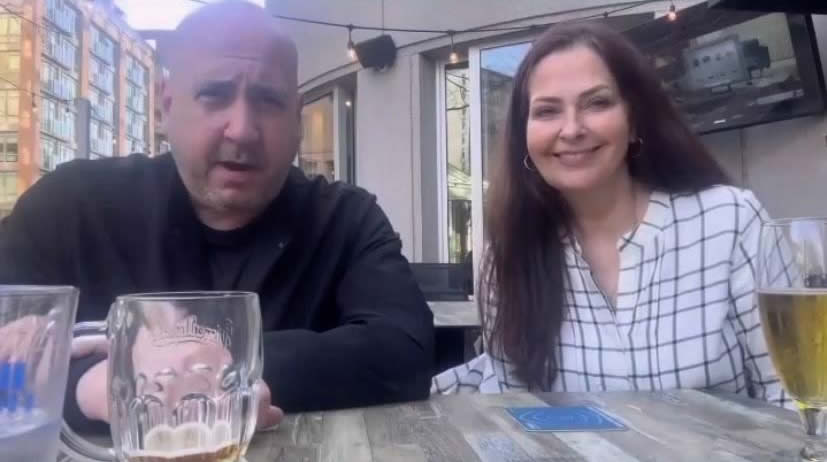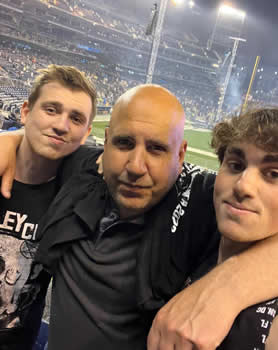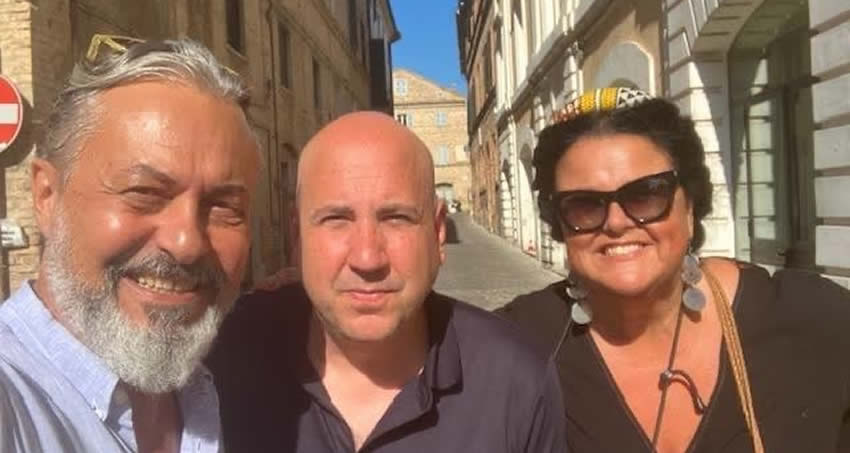

Features Up Close: Alex Finlay
A Childhood Deed to Die For
 By K.L. Romo
By K.L. Romo
They guard a secret that just might get them killed.
In his newest thriller WHAT HAVE WE DONE, bestselling author Alex Finlay uses compelling characterizations and an intriguing plot to explore childhood trauma, how it shapes the people we become, and how committing a terrible act forever binds those involved.
Twenty-five years ago, five foster kids shot bullets into a hole in the ground, standing around its perimeter, then pushed the dirt back with their hands to hide the evidence. They hoped this would stop the abuse they suffered at their foster home, Savior House.
Now grown, Jenna thought she was done with the clandestine and dangerous part of her life. She’d left The Corporation behind. She’s married to Simon—a tax lawyer and widower—and raising his three girls.
Aging rock and roller, Donnie Danger, just ended his three months of sobriety. His best friend and fellow foster home resident, Benny, had been like a brother, and now he’s dead. Donnie’s trying to hold it together for his band’s performance on the Legends of Rock Cruise, but the band made it clear they were through with him.
Nico is now the executive producer of the most popular reality show on cable, The Miners. When the star of the show sends him a text to meet him down in the mine after hours, Nico thinks it’s odd, but goes anyway.
Tech guru and successful businessman, Artemis Templeton—they’d called him Arty—barely escaped execution in an assassination attempt gone wrong.
All these years later, someone with a bizarre but deadly pneumatic weapon is trying to kill them. Why? What is the connection to their desperate deed at Savior House when they were kids? If they can’t figure out what’s going on, they’ll end up dead.
Here, The Big Thrill chats with Finlay about his inspiration for the novel, his unique character development, and how he went from practicing law to writing fiction.
What was the inspiration for the story and characters in WHAT HAVE WE DONE?
My main inspiration was avoiding being in breach of contract for missing my deadline. Kidding!
I love exploring how people deal with, and overcome, trauma. I’d read somewhere about how many people with childhood trauma somehow later channel that into highly successful careers. That was the spark for the idea of a group of teenagers in an abusive foster home growing up and having accomplished lives, but also a secret that will come back to haunt them 25 years later.

Bestselling author Sarah Pekkanen pops in to try to save Finlay’s “disastrous” Instagram takeover of his publisher’s IG account.
How did you come up with the unusual characterizations for Jenna, a trained assassin turned mom, Donnie, an aging rocker, and Nico, a reality show producer?
For Donnie, I’ve long wanted to create an aging rocker as a character. In fact, seven years ago I interviewed the members of a popular 80s band knowing that someday I’d use it for a character. That day came when I wrote my first Donnie chapter for WHAT HAVE WE DONE.
For Nico, I have a friend who’s an executive producer of hit reality TV shows, so I had access to someone with a unique job. And the great fictional characters of others—Jason Bourne, Nikita, and Orphan X to name a few—inspired Jenna.
Why did you explore the unique bond that some foster kids share, and sometimes the terrible things that happen while in foster care?
I think we’re all products of our childhoods, and I always find it fascinating when those with the most difficult ones turn out to be very successful. There’s something inspiring in that.
How did you go from being a DC lawyer to a bestselling thriller author?
A lot of hard work—I got more than my 10,000 hours of practice in before I sold my first novel. Beyond that, there are parallels between the two careers: in both, writing is essential and in both, we’re telling stories. The beauty of fiction is that I don’t need to worry about those pesky things called the facts.
With your legal background, do you have any plans to write legal thrillers?
Not currently, though most of my work integrates my legal background. In Every Last Fear, the story centered on wrongful convictions, inspired in part by a case I worked. In The Night Shift, a main character was a public defender, which allowed me to delve into problems with funding and misconceptions about PDs.
WHAT HAVE WE DONE is my first book that doesn’t draw on my legal background, though the years spent drafting legal briefs and learning to write lean are the cornerstones of all my work.
What advice can you give other writers?

Finlay and sons at a Motley Crüe concert; celebrating his aging rocker character in WHAT HAVE WE DONE.
One: Read. I’ve never met a successful writer who isn’t also a reader.
Two: Write. A well-known author once gave me the best advice: the only thing you control in this business is the writing, so when you’re out for submission on one project, be working on another. It’s the only thing that will take your mind off the waiting (everything in publishing moves at a glacial pace), the rejection (which is inevitable), and worries that you’ll never come up with a good idea for your next book (you never will if you don’t try).
Can you give us a hint about your next novel?
I once heard someone say that readers and publishers want three things after an author has published a successful book: the same, different, better. That’s what I strive for—it will be the same in the sense that it will be what readers might expect from an Alex Finlay novel, different in many ways, including a European setting, and better, well, we’ll see what readers think.
Tell us something about yourself your fans might not already know.
I’m terrible at social media (wait, I’m sure my readers already know that). Something people always find surprising is that I write the first draft of my novels on my phone while I go on long walks.
- The Big Thrill Recommends: WHAT YOU LEAVE BEHIND by Wanda M. Morris - June 27, 2024
- Sally Hepworth - May 10, 2024
- Katherine Ramsland - April 25, 2024


